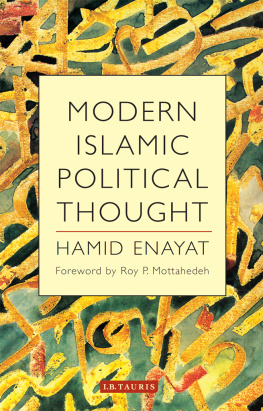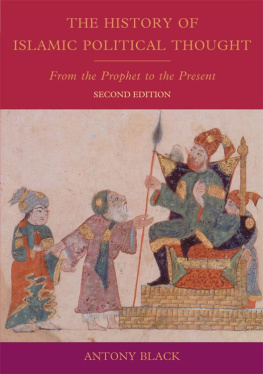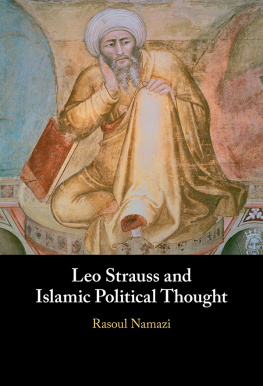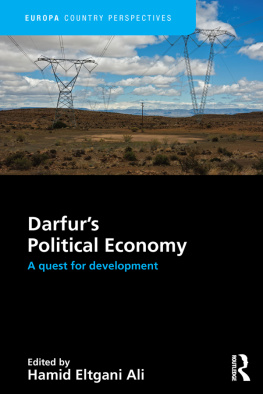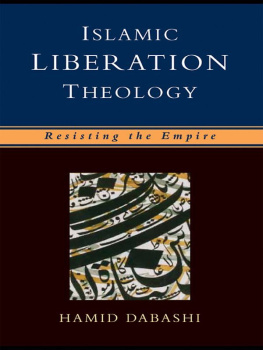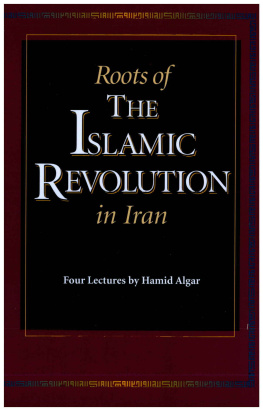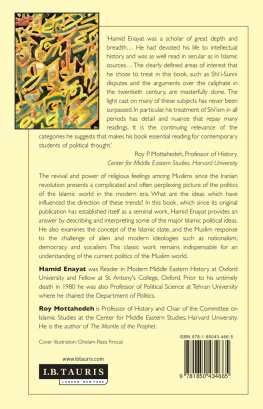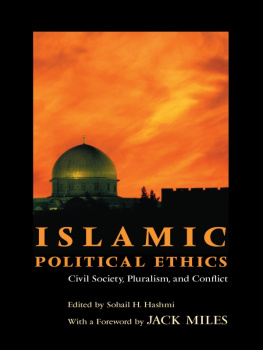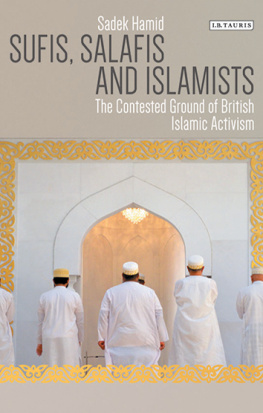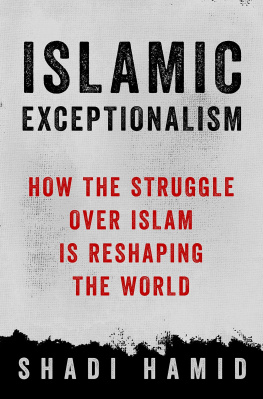Hamid Enayat - Modern Islamic Political Thought
Here you can read online Hamid Enayat - Modern Islamic Political Thought full text of the book (entire story) in english for free. Download pdf and epub, get meaning, cover and reviews about this ebook. year: 2005, publisher: I.B. Tauris, genre: Religion. Description of the work, (preface) as well as reviews are available. Best literature library LitArk.com created for fans of good reading and offers a wide selection of genres:
Romance novel
Science fiction
Adventure
Detective
Science
History
Home and family
Prose
Art
Politics
Computer
Non-fiction
Religion
Business
Children
Humor
Choose a favorite category and find really read worthwhile books. Enjoy immersion in the world of imagination, feel the emotions of the characters or learn something new for yourself, make an fascinating discovery.
- Book:Modern Islamic Political Thought
- Author:
- Publisher:I.B. Tauris
- Genre:
- Year:2005
- Rating:5 / 5
- Favourites:Add to favourites
- Your mark:
- 100
- 1
- 2
- 3
- 4
- 5
Modern Islamic Political Thought: summary, description and annotation
We offer to read an annotation, description, summary or preface (depends on what the author of the book "Modern Islamic Political Thought" wrote himself). If you haven't found the necessary information about the book — write in the comments, we will try to find it.
Modern Islamic Political Thought — read online for free the complete book (whole text) full work
Below is the text of the book, divided by pages. System saving the place of the last page read, allows you to conveniently read the book "Modern Islamic Political Thought" online for free, without having to search again every time where you left off. Put a bookmark, and you can go to the page where you finished reading at any time.
Font size:
Interval:
Bookmark:
Modern Islamic Political Thought

New edition published in 2005 by I.B.Tauris & Co Ltd
6 Salem Road, London W2 4BU
175 Fifth Avenue, New York NY 10010
www.ibtauris.com
In the United States of America and Canada distributed by
Palgrave Macmillan a division of St. Martins Press
175 Fifth Avenue, New York NY 10010
First published 1982 by Macmillan Press Ltd
Copyright 1982 Hamid Enayat
Foreword copyright 2004 Roy Mottahedeh
The right of Hamid Enayat to be identified as the author of this work has been asserted by the author in accordance with the Copyright, Designs and Patent Act 1988.
All rights reserved. Except for brief quotations in a review, this book, or any part thereof, may not be reproduced, stored in or introduced into a retrieval system, or transmitted, in any form or by any means, electronic, mechanical, photocopying, recording or otherwise, without the prior written permission of the publisher.
HB ISBN 978 1 85043 465 8
PB ISBN 978 1 85043 466 5
eISBN 978 0 85773 146 3
A full CIP record for this book is available from the British Library
A full CIP record for this book is available from the Library of Congress
Library of Congress catalog card: available
Offset by Avon DataSet Ltd, Bidford on Avon, Warwickshire
To Anna, Hd and meneh
by
Roy P. Mottahedeh
It is a great pleasure to introduce Hamid Enayats Modern Islamic Political Thought to a new generation of readers. Political thought is by its nature a diffuse subject stretching from political philosophy to everyday sentiments on proper and/or necessary political order. Its history may be written with a view to emphasising the continuity of a tradition or the pressures of immediate political circumstances on the Islamic political thinkers considered.
Hamid Enayat was a scholar of great depth and breadth. He was a social as well as an intellectual historian and in his preface he acknowledges that hundreds more pages would be needed to place the books he considers in the full day-to-day context in which they appeared. By and large he omits this day-to-day context.
Enayats book is, nevertheless, a classic because he chose clearly defined topics and wrote about them with insight and great learning. He was unusually well-placed to do so. He had devoted his life to intellectual history and was as well-read in secular as in Islamic sources. His translations into Persian of Aristotle and Hegel are still much admired. Moreover, he was one of the very few scholars who truly knew both Arabic and Persian. His enormous reading in these languages created a book that emphasised not only the old stand-bys such as Rashd Ri and abab but also somewhat less well-known authors such as Muibb ad-Dn al-Khab and Khlid Muammad Khlid.
The clearly defined areas of interest that he chose to treat in this book, such as ShSunn disputes and the arguments over the caliphate in the twentieth century, are masterfully done. The light cast on many of these subjects has never been surpassed. In particular, his treatment of Shsm in all periods has detail and nuance that repay many readings. It is the continuing relevance of the categories he suggests that makes his book essential reading for contemporary students of political thought. When he proposes that the basic mood of Shsm (allowing for many exceptions) was: particularism, esotericism, historicism, idealism, a pessimistic conception of human nature, a paradoxical apathy in politics, and emotionalism (p. ), one recognises that this is a well-thought through catalogue with which one might disagree, yet which one would be foolish to disregard. In similar ways Enayats classifications and points of view find continuing relevance in suggesting categories and perspectives, the importance of which continues to impress.
The book has another unusual advantage in that, while being generally objective in its portrayal of modern Islamic thought, it is written by an insider who is intellectually engaged with his sources and not by an antiquarian who describes discussions which have no value whatsoever in and of themselves. He even enters into some of the arguments, for example his defence of the ideas of Al Abd ar-Rziq.
Thanks to his engagement with the intellectual history he discusses, the scholarship with which he illuminates the topics he chooses and the very precise yet handsome language in which he expresses himself, his work nearly becomes a primary source itself to which we necessarily return. In spite of later developments and recent detailed studies of the figures he treats, Hamid Enayat leaves us with a vision which any serious student of this subject must reckon. Readers of this book will join his many admiring students, colleagues and friends in regretting that we lost him so early in his life.
Roy P. Mottahedeh
Professor of History
Center for Middle Eastern Studies
Harvard University
This book describes and interprets the major political ideas among Muslims in the twentieth century, particularly those expressed by the Egyptians and Iranians but also a few writers and thinkers in Pakistan, India, Lebanon, Syria and Iraq. It is a book concerned mainly with ideas: history and sociology have been called to aid only on those occasions when they help to illuminate the background of thoughts. But what needs more emphasis is that it is a book concerned not so much with ideas set forth by Muslims, as with those which are Islamic that is to say, are articulated in the recognised terms and categories of Islamic jurisprudence, theology and related disciplines, however much they may sound unorthodox or unconventional. This naturally leaves out a great many Muslim intellectuals who may deserve serious study in other perspectives, but it arises from the conviction that in any effort to understand, let alone criticise, Muslim contributions to the political debates of our time, the procedure by which a thinker has arrived at an idea should be given as much weight as the idea itself. It is not enough to extol a writer for his brave new ideas without first ascertaining the extent to which his credal, epistemological and methodological premises have ensured the continuity of Islamic thought. Otherwise, one is apt to allow fascination with novelty to keep oneself from differentiating what is germane from what is extraneous to Islamic culture. The question of any ulterior or hidden motive that these authors may have harboured has been kept out of the analysis, not only because a thorough examination of them threatens to turn a history of ideas into histoire vnementielle, but also because ideas seem to have a life of their own: people, especially those of the generations subsequent to the authors, often tend to perceive ideas with little or no regard for the authors insidious designs, unless they are endowed with a capacity for mordant cynicism.
The book starts with an introduction outlining the way in which the traditional heritage has impinged on the development of modern thoughts, or can make them cogent and appealing to religious-minded audiences. This is followed by a study of the political differences between the two main schools or sects in Islam Shsm and Sunnsm, and especially on the two-fold process of conflict and concord between them. The main intention is to show that the relationship between the two has been slowly changing in recent times, at least in the realm of political doctrines, from confrontation to cross-sectarian fertilisation. This approach later re-emerges at several other points of the book, with more examples of the implicit or explicit convergence between the two. The remaining chapters are devoted to two basic themes and their ramifications: the concept of the Islamic State from the time it was revived after the abolition of the Caliphate in Turkey in the twenties till the late seventies, and the Muslim response to the challenge of the alien, modern ideologies of nationalism, democracy and socialism.
Next pageFont size:
Interval:
Bookmark:
Similar books «Modern Islamic Political Thought»
Look at similar books to Modern Islamic Political Thought. We have selected literature similar in name and meaning in the hope of providing readers with more options to find new, interesting, not yet read works.
Discussion, reviews of the book Modern Islamic Political Thought and just readers' own opinions. Leave your comments, write what you think about the work, its meaning or the main characters. Specify what exactly you liked and what you didn't like, and why you think so.

